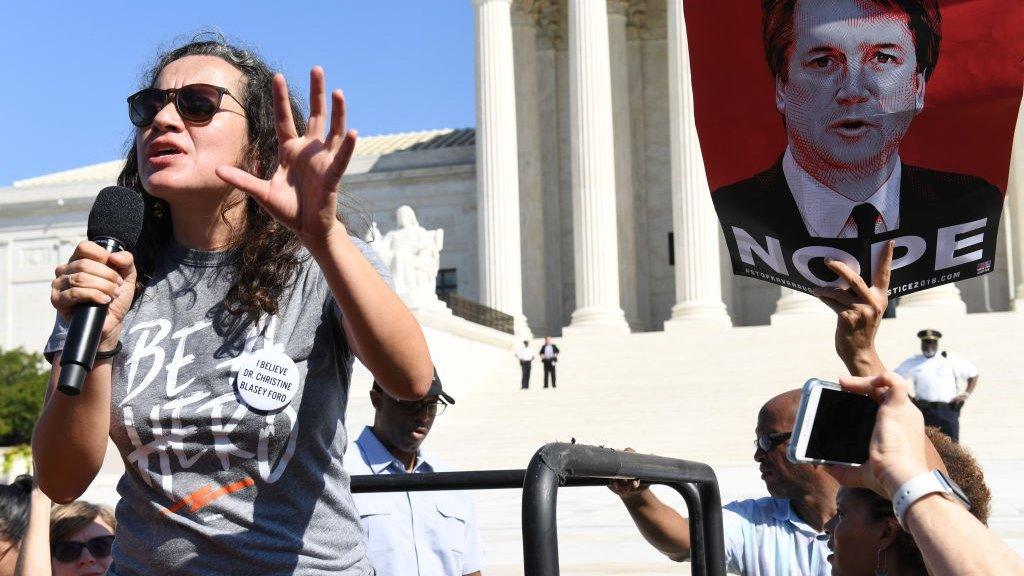Kavanaugh confirmation: What Trump's 'elevator screamers' tweet tells us
- Published

Donald Trump has run hot and cold in his attitude toward the controversy swirling around his appointment of Brett Kavanaugh to the US Supreme Court.
With a few notable exceptions, he has displayed restraint in attacking Mr Kavanaugh's accusers and those who believe them.
One of those exceptions, however, came via Twitter on Friday morning, just before the Senate began a series of votes that will determine Mr Kavanaugh's fate.

There's a lot to unpack in this tweet, so let's break it down.
'Rude elevator screamers'
In this tweet, Mr Trump takes aim at Ana Maria Archila and Maria Gallagher, the two women who cornered Senator Jeff Flake in a lift last Friday and accused him of ignoring women like them, who are victims of sexual assault.
Archila and Gallagher are widely credited for helping to convince the Arizona senator, who had said he would vote for Mr Kavanaugh, into asking for the one-week delay in voting to accommodate an expanded FBI investigation into the accusations.
"I was sexually assaulted and nobody believed me," Gallagher told Mr Flake. "I didn't tell anyone, and you're telling all women that they don't matter."
Republican Senator Jeff Flake is challenged by a sexual assault survivor.
Now Mr Trump appears to be attempting to not only belittle the two women by labelling them "elevator screamers," but also to question their motivations.
Archila is the co-executive director of the New York-based community organising group Center for Popular Democracy. Gallagher, who says she has never been involved in a protest before, is a recent college graduate from New York who currently lives in Washington state.
Shortly after Mr Trump fired off his tweet, Archila offered her response.
"No one can pay for someone's lived experiences," she wrote on Twitter, external. "The pain, the trauma and the rage that I expressed when I spoke with Senator Jeff Flake in an elevator were my own, and I held it for more than 30 years to protect the people I love from it."

'The professionally made identical signs'
Accusing one's opponents of making organised protests look like a grass-roots movement is a tried and true political tactic.
The anti-Kavanaugh protests that have rolled through Washington over the past week have been organised by a variety of liberal advocacy groups, including Move On and Ultraviolet - organisation that includes providing pre-printed signage.
Women from both sides of the debate had pre-printed signs
Pro-Kavanaugh demonstrators have had their own demonstrations, with their own pre-printed signs. Mass protests very rarely happen organically - they require logistics and planning, and that requires time and money.
Tens of millions of dollars has been directed at the Kavanaugh confirmation battle from both sides, a sign of exactly how important a lifetime seat on a sharply divided Supreme Court is to the direction of the US for decades to come.

"Paid for by Soros and others"
Here Mr Trump references that long-time bogeyman for the right, billionaire financier George Soros. Like the Koch Brothers for liberals, Soros for conservatives is the incarnation of the deep-pocketed sinister force behind all their opponents' actions.
Most Americans probably don't know who Soros is, but for those on the right - particularly those with a predilection for conspiracy-theorising - he's a regular topic of conversation.
In fact, Soros does fund numerous progressive causes - to the tune of $10m to political action committees in 2018 alone. It puts him in the higher echelon of political donors, external, although still distant to conservative Sheldon Adelson and progressive Tom Steyer.
Soros drew Mr Trump's attention in this case perhaps because he supports the Center for Popular Democracy and Ultraviolet, which not only helped put together the protest but also (in a press release that has since been deleted from their website, external) claimed Archila and Gallagher as members.

"Made in the basement from love!"
The president closes with another shot at the sign-making proclivities of his opponents. (Twitter's expanded 280-character limit strikes again.)
Mr Trump himself has a somewhat complicated relation with the use of paid supporters. His presidential campaign reportedly offered actors $50, external to cheer at his June 2015 Trump Tower announcement speech. (The campaign apparently also had a pile of "homemade" signs to hand out before the event.)
At some point, however, Mr Trump's presidential campaign took on a life of its own. It was not uncommon to see roughly-drawn signs and t-shirts at his rallies, while hand-lettered yard displays and billboards dotted the American countryside.
'Ford is a liar': Trump supporters' unequivocal backing for Kavanaugh
It was then that candidate Trump first started going after protesters and opponents for having manufactured signs, instead of ones like those presumably made lovingly in basements by his supporters.
Now, with this Friday morning fusillade, the president is stoking the fire that has fuelled his base for the past few years.
With just over a month until the mid-term elections, Mr Trump has been searching for ways to motivate his supporters in the face of an active and engaged Democrat opposition.
Tweeting about unruly protesters funded by shady liberal billionaires who threaten to derail his - and their - political hopes and dreams may be part of his electoral strategy. In 2018, as it was in 2016, it's us-against-them.

#Troublemakers
Mr Trump has an uncanny ability to come up with memorable labels for his political opponents. He ends his tweet by dusting off "troublemakers" - a word last used to describe counter-protesters who clashed with white nationalist demonstrators in the Charlottesville last year.
The hashtag is already getting hijacked by women's rights activists, who appear to be embracing the term.

"Never doubt that a small group of thoughtful, committed #Troublemakers can change the world," tweeted Alabama Democratic legislator Terri A. Sewell., external "It's the only thing that ever has. #GoodTrouble"